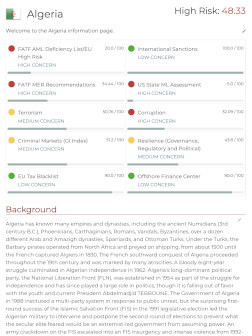
Thailand Country Summary
Medium Risk
View full Ratings TableSanctions
Lower Concern
FATF AML Deficient List
Lower Concern
Terrorism
Medium Concern
Corruption
Higher Concern
US State ML Assessment
Higher Concern
Criminal Markets (GI Index)
Medium Concern
EU Tax Blacklist
Lower Concern
Offshore Finance Center
Lower Concern
Please note that although the below Summary will give a general outline of the AML risks associated with the jurisdiction, if you are a Regulated entity then you may need to demonstrate that your Jurisdictional AML risk assessment has included a full assessment of the risk elements that have been identified as underpinning overall Country AML risk. To satisfy these requirements, we would recommend that you use our Subscription area.
If you would like a demo of our Subscription area, please reserve a day/time that suits you best using this link, or you may Contact Us for further information.
Anti Money Laundering
FATF Status
Thailand is no longer on the FATF List of Countries that have been identified as having strategic AML deficiencies
Compliance with FATF Recommendations
The last follow-up Mutual Evaluation Report relating to the implementation of anti-money laundering and counter-terrorist financing standards in Thailand was undertaken in 2023. According to that Evaluation, Thailand was deemed Compliant for 4 and Largely Compliant for 29 of the FATF 40 Recommendations. It was also deemed Highly Effective for 0 and Substantially Effective for 4 with regard to the 11 areas of Effectiveness of its AML/CFT Regime.
Sanctions
There are currently no international sanctions in force against Thailand.
Criminality
Rating |
0 (bad) - 100 (good) |
|---|---|
| Transparency International Corruption Index | 34 |
| World Bank: Control of Corruption Percentile Rank | 36 |
Thailand faces significant challenges related to crime and corruption, with widespread issues in bribery and governance that undermine efforts to combat these problems. Despite having a legal framework and various institutions aimed at curbing corruption, the influence of corrupt practices remains strong, particularly in government licensing and procurement processes, while the country grapples with serious criminal markets including human trafficking, drug trafficking, and cybercrime.
Economy
Thailand's economy is characterized as an upper middle-income market with a robust half-trillion-dollar GDP, supported by pro-investment policies and advanced infrastructure. The civilian-led coalition government, established after the May 2023 elections, prioritizes foreign direct investment (FDI) and domestic stimulus as key components of its economic growth strategy, further enhanced by the Board of Investment (BOI) which facilitates investment through various incentives. While the Foreign Business Act (FBA) imposes certain restrictions on foreign ownership in specific sectors, U.S. investors benefit from the U.S.-Thai Treaty of Amity, which allows them to operate on equal footing with Thai nationals, thereby fostering a favorable environment for investment in high-tech industries and clean energy initiatives.
Subscribe to
Professional Plus

- Unlimited Access to full Risk Reports
- Full Dataset Download
- API Access
- Virtual Asset Risk Assessments

